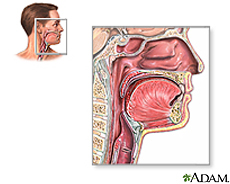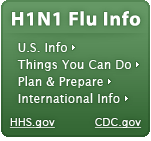
Cáncer de garganta

Institutos Nacionales de la Salud
El cáncer de garganta es un tipo de cáncer de cabeza y cuello. Se lo denomina de diferentes maneras dependiendo de cuál parte de la garganta es afectada. Las partes de su garganta se llaman orofaringe, hipofaringe, nasofaringe y laringe o caja laríngea.
Los principales factores de riesgo del cáncer de garganta son el consumo de tabaco y beber alcohol en forma excesiva. Algunos tipos de cáncer de garganta tienen otros factores de riesgo. Por ejemplo, tener VPH es un factor de riesgo del cáncer orofaríngeo.
Los síntomas del cáncer de garganta pueden incluir:
- Dolor de garganta que no mejora
- Una protuberancia en el cuello
- Dolor o zumbido en los oídos
- Dificultad para tragar
- Dolor de oído
Para diagnosticar el cáncer de garganta, los médicos pueden hacer un examen físico y de historia clínica, pruebas de imagen y una biopsia. Usted también puede necesitar otras pruebas, dependiendo del tipo de cáncer. Los tratamientos incluyen cirugía, radioterapia y quimioterapia. El tratamiento para algunos tipos de cáncer de garganta también puede incluir terapia dirigida. La terapia dirigida utiliza sustancias que atacan a las células cancerosas sin dañar las células normales.
NIH: Instituto Nacional del Cáncer
- Biopsia de lesión orofaríngea (Enciclopedia Médica)También en inglés
- Estadios del cáncer de hipofaringe
 (Instituto Nacional del Cáncer)También en inglés
(Instituto Nacional del Cáncer)También en inglés - Estadios del cáncer de laringe
 (Instituto Nacional del Cáncer)También en inglés
(Instituto Nacional del Cáncer)También en inglés - Estadios del cáncer de nasofaringe
 (Instituto Nacional del Cáncer)También en inglés
(Instituto Nacional del Cáncer)También en inglés - Estadios del cáncer de orofaringe
 (Instituto Nacional del Cáncer)También en inglés
(Instituto Nacional del Cáncer)También en inglés - ¿Se puede detectar a tiempo el cáncer de orofaringe y de cavidad oral? (Sociedad Americana del Cáncer)También en inglés
- ¿Se puede encontrar los cánceres de laringe y de hipofaringe en sus etapas tempranas? (Sociedad Americana del Cáncer)También en inglés
 ¿Es posible prevenir los cánceres de laringe y de hipofaringe? (Sociedad Americana del Cáncer)También en inglés
¿Es posible prevenir los cánceres de laringe y de hipofaringe? (Sociedad Americana del Cáncer)También en inglés- ¿Se puede prevenir el cáncer de orofaringe y de cavidad oral? (Sociedad Americana del Cáncer)
- Aspectos generales de las opciones de tratamiento (cáncer de hipofaringe)
 (Instituto Nacional del Cáncer)También en inglés
(Instituto Nacional del Cáncer)También en inglés - Aspectos generales de las opciones de tratamiento (cáncer de laringe)
 (Instituto Nacional del Cáncer)También en inglés
(Instituto Nacional del Cáncer)También en inglés - Aspectos generales de las opciones de tratamiento (cáncer de nasofaringe)
 (Instituto Nacional del Cáncer)También en inglés
(Instituto Nacional del Cáncer)También en inglés - Aspectos generales de las opciones de tratamiento (cáncer de orofaringe)
 (Instituto Nacional del Cáncer)También en inglés
(Instituto Nacional del Cáncer)También en inglés - ¿Cómo se tratan los cánceres de laringe y de hipofaringe? (Sociedad Americana del Cáncer)
- Laringectomía (Enciclopedia Médica)También en inglés
- Opciones de tratamiento por etapa para el cáncer de orofaringe y de cavidad oral (Sociedad Americana del Cáncer)
 Cambios en el estilo de vida después del cáncer de laringe o de hipofaringe (Sociedad Americana del Cáncer)También en inglés
Cambios en el estilo de vida después del cáncer de laringe o de hipofaringe (Sociedad Americana del Cáncer)También en inglés- Llagas o dolor en la boca o irritación de garganta (quimioterapia y radiación) (Sociedad Americana del Cáncer)También en inglés
- ¿Qué sucede después del tratamiento para el cáncer de orofaringe y de cavidad oral? (Sociedad Americana del Cáncer)También en inglés
- ¿Qué debe preguntar a su médico sobre los cánceres de laringe o de hipofaringe? (Sociedad Americana del Cáncer)También en inglés
- Información general sobre el cáncer de la hipofaringe
 (Instituto Nacional del Cáncer)También en inglés
(Instituto Nacional del Cáncer)También en inglés - Información general sobre el cáncer de la nasofaringe
 (Instituto Nacional del Cáncer)También en inglés
(Instituto Nacional del Cáncer)También en inglés - Información general sobre el cáncer de la orofaringe
 (Instituto Nacional del Cáncer)También en inglés
(Instituto Nacional del Cáncer)También en inglés - Información general sobre el cáncer de laringe
 (Instituto Nacional del Cáncer)También en inglés
(Instituto Nacional del Cáncer)También en inglés - Virus del papiloma humano (VPH) y el cáncer orofaríngeo (Centros para el Control y la Prevención de Enfermedades)También en inglés
- Cáncer de garganta o laringe
 (Enciclopedia Médica)También en inglés
(Enciclopedia Médica)También en inglés
- ¿Cuáles son las estadísticas clave sobre tipos de cáncer de orofaringe y de cavidad oral? (Sociedad Americana del Cáncer)También en inglés
- ¿Qué avances hay en la investigación y el tratamiento de los cánceres de laringe y de hipofaringe? (Sociedad Americana del Cáncer)También en inglés
- Tasas de incidencia del cáncer orofaríngeo asociado al VPH por raza y grupo étnico
 (Centros para el Control y la Prevención de Enfermedades)También en inglés
(Centros para el Control y la Prevención de Enfermedades)También en inglés
- Diccionario de cáncer
 (Instituto Nacional del Cáncer)También en inglés
(Instituto Nacional del Cáncer)También en inglés
- Instituto Nacional del Cáncer
 También en inglés
También en inglés - Organizaciones que ofrecen servicios de apoyo
 (Instituto Nacional del Cáncer)También en inglés
(Instituto Nacional del Cáncer)También en inglés - Programa de Centros Oncológicos del Instituto Nacional del Cáncer
 (Instituto Nacional del Cáncer)También en inglés
(Instituto Nacional del Cáncer)También en inglés
Throat Cancer
Also called: Hypopharyngeal cancer, Laryngeal cancer, Laryngopharyngeal cancer, Nasopharyngeal cancer, Oropharyngeal cancer, Pharyngeal cancer
MEDICAL ENCYCLOPEDIA
National Institutes of Health
Throat cancer is a type of head and neck cancer. Throat cancer has different names, depending on which part of the throat is affected. The different parts of your throat are called the oropharynx, the hypopharynx, the nasopharynx, and the larynx, or voice box.
The main risk factors for throat cancer are using tobacco heavy drinking. Certain types of throat cancer also have other risk factors. For example, having HPV is a risk factor for oropharyngeal cancer.
Symptoms of throat cancer may include
- A sore throat that does not go away
- A lump in the neck
- Pain or ringing in the ears
- Trouble swallowing
- Ear pain
To diagnose throat cancers, doctors may do a physical exam and history, imaging tests, and a biopsy. You may also need other tests, depending on the type of cancer. Treatments include surgery, radiation therapy, and chemotherapy. Treatment for some types of throat cancer may also include targeted therapy. Targeted therapy uses substances that attack cancer cells without harming normal cells.
NIH: National Cancer Institute
- Can Laryngeal and Hypopharyngeal Cancers Be Found Early? (American Cancer Society)Also in Spanish
- Can Nasopharyngeal Cancer Be Found Early? (American Cancer Society)Also in Spanish
- Stages of Hypopharyngeal Cancer
 (National Cancer Institute)Also in Spanish
(National Cancer Institute)Also in Spanish - Stages of Laryngeal Cancer
 (National Cancer Institute)Also in Spanish
(National Cancer Institute)Also in Spanish - Stages of Nasopharyngeal Cancer
 (National Cancer Institute)Also in Spanish
(National Cancer Institute)Also in Spanish - Stages of Oropharyngeal Cancer
 (National Cancer Institute)Also in Spanish
(National Cancer Institute)Also in Spanish
- Can Laryngeal and Hypopharyngeal Cancers Be Prevented? (American Cancer Society)Also in Spanish
- Hypopharyngeal Cancer Treatment
 (National Cancer Institute)
(National Cancer Institute) - Treatment Option Overview (Laryngeal Cancer)
 (National Cancer Institute)
(National Cancer Institute) - Treatment Option Overview (Nasopharyngeal Cancer)
 (National Cancer Institute)
(National Cancer Institute) - Treatment Option Overview (Oropharyngeal Cancer)
 (National Cancer Institute)Also in Spanish
(National Cancer Institute)Also in Spanish - Treatment Options by Stage (Hypopharyngeal Cancer)
 (National Cancer Institute)Also in Spanish
(National Cancer Institute)Also in Spanish - Treatment Options by Stage (Laryngeal Cancer)
 (National Cancer Institute)Also in Spanish
(National Cancer Institute)Also in Spanish - Treatment Options by Stage (Nasopharyngeal Cancer)
 (National Cancer Institute)Also in Spanish
(National Cancer Institute)Also in Spanish - Treatment Options by Stage (Oropharyngeal Cancer)
 (National Cancer Institute)
(National Cancer Institute)
- Lifestyle Changes After Laryngeal or Hypopharyngeal Cancer (American Cancer Society)Also in Spanish
- Mouth or Throat Pain or Sores (American Cancer Society)Also in Spanish
- What Happens After Treatment for Laryngeal and Hypopharyngeal Cancer? (American Cancer Society)Also in Spanish
- What Happens After Treatment for Nasopharyngeal Cancer? (American Cancer Society)
- What Should You Ask Your Doctor about Laryngeal and Hypopharyngeal Cancer? (American Cancer Society)Also in Spanish
- General Information about Hypopharyngeal Cancer
 (National Cancer Institute)Also in Spanish
(National Cancer Institute)Also in Spanish - General Information about Laryngeal Cancer
 (National Cancer Institute)Also in Spanish
(National Cancer Institute)Also in Spanish - General Information about Nasopharyngeal Cancer
 (National Cancer Institute)Also in Spanish
(National Cancer Institute)Also in Spanish - General Information about Oropharyngeal Cancer
 (National Cancer Institute)Also in Spanish
(National Cancer Institute)Also in Spanish - Human Papillomavirus (HPV) and Oropharyngeal Cancer (Centers for Disease Control and Prevention)Also in Spanish
- Cancer of the throat or larynx
 (Medical Encyclopedia)Also in Spanish
(Medical Encyclopedia)Also in Spanish
- Cancer of the Larynx
 (National Cancer Institute)
(National Cancer Institute) - Cancer of the Oral Cavity and Pharynx
 (National Cancer Institute)
(National Cancer Institute) - HPV-Associated Oropharyngeal Cancer Rates by Race and Ethnicity (Centers for Disease Control and Prevention)Also in Spanish
- What Are the Key Statistics about Laryngeal and Hypopharyngeal Cancers? (American Cancer Society)
- What Are the Key Statistics about Oral Cavity and Oropharyngeal Cancers? (American Cancer Society)Also in Spanish
- What's New in Laryngeal and Hypopharyngeal Cancer Research and Treatment? (American Cancer Society)Also in Spanish
- What's New in Nasopharyngeal Cancer Research and Treatment? (American Cancer Society)
- ClinicalTrials.gov: Hypopharyngeal Neoplasms
 (National Institutes of Health)
(National Institutes of Health) - ClinicalTrials.gov: Laryngeal Neoplasms
 (National Institutes of Health)
(National Institutes of Health) - ClinicalTrials.gov: Nasopharyngeal Neoplasms
 (National Institutes of Health)
(National Institutes of Health) - ClinicalTrials.gov: Oropharyngeal Neoplasms
 (National Institutes of Health)
(National Institutes of Health) - ClinicalTrials.gov: Pharyngeal Neoplasms
 (National Institutes of Health)
(National Institutes of Health)
- Dictionary of Cancer Terms
 (National Cancer Institute)Also in Spanish
(National Cancer Institute)Also in Spanish - Larynx Anatomy
 (National Cancer Institute)
(National Cancer Institute)
- American Academy of Otolaryngology--Head and Neck Surgery
- American Cancer Society
- Find a Cancer Doctor (American Society of Clinical Oncology)
- Find an ENT (American Academy of Otolaryngology--Head and Neck Surgery)
- National Cancer Institute
 Also in Spanish
Also in Spanish - NCI Designated Cancer Centers
 (National Cancer Institute)Also in Spanish
(National Cancer Institute)Also in Spanish - Organizations That Offer Support Services
 (National Cancer Institute)Also in Spanish
(National Cancer Institute)Also in Spanish
- Laryngectomy (Medical Encyclopedia)Also in Spanish
- Swallowing problems (Medical Encyclopedia)Also in Spanish
- Throat or larynx cancer (Medical Encyclopedia)Also in Spanish
- What to Know about External Beam Radiation Therapy

 (National Cancer Institute) - PDFAlso in Spanish
(National Cancer Institute) - PDFAlso in Spanish






















.png)









No hay comentarios:
Publicar un comentario